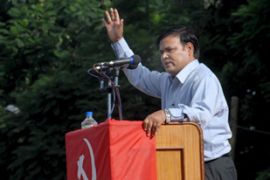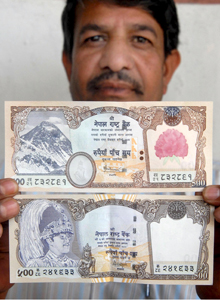Nepalese monarchy voted out
Himalayan country will become a republic following elections in April 2008.

Published On 28 Dec 2007
The government had rejected their demands saying it was against an earlier agreement to let the elected assembly decide the fate of the king.
The provisional parliament voted for Nepal, once the world’s only Hindu kingdom, to become a “federal democratic republican state”.
Officials said King Gyanendra would continue to live in the palace without any power until the elections.
Maoist gain
 |
| The king’s portrait has been replaced on bank notes [EPA] |
The Maoists, who signed a peace deal with the government in 2006 following a 10-year armed campaign, had quit the interim government in a move that delayed the assembly polls set for November and indefinitely clouded the pact.
Krishna Bahadur Mahara, the Maoist’s leader, said: “That Nepal will become a federal democratic republic [and] will be written in the constitution is not an ordinary thing.
“The implementation of the decision will take place gradually. It is okay.”
But Shrish Shumshere Rana, a member of King Gyanendra’s government, formed after he adopted direct rule in 2005, said: “They are not allowing the people to raise voice in favour of the monarchy. It is a farce.”
Fading popularity
The monarch bowed to weeks of protests to end direct rule in 2006, and handed power back to political parties.
This prompted last year’s landmark deal between the government and the Maoists who ended their decade-long conflict which caused more than 13,000 deaths.
The new government has already stripped the monarch of almost all powers including his control over the army, replaced king’s picture in some currency notes by that of Mount Everest and removed the king’s portraits from public buildings.
The responsibilities of the king, who is traditionally considered an incarnation of the Hindu god, Vishnu, have been transferred to Girija Prasad Koirala, the prime minister.
Source: News Agencies